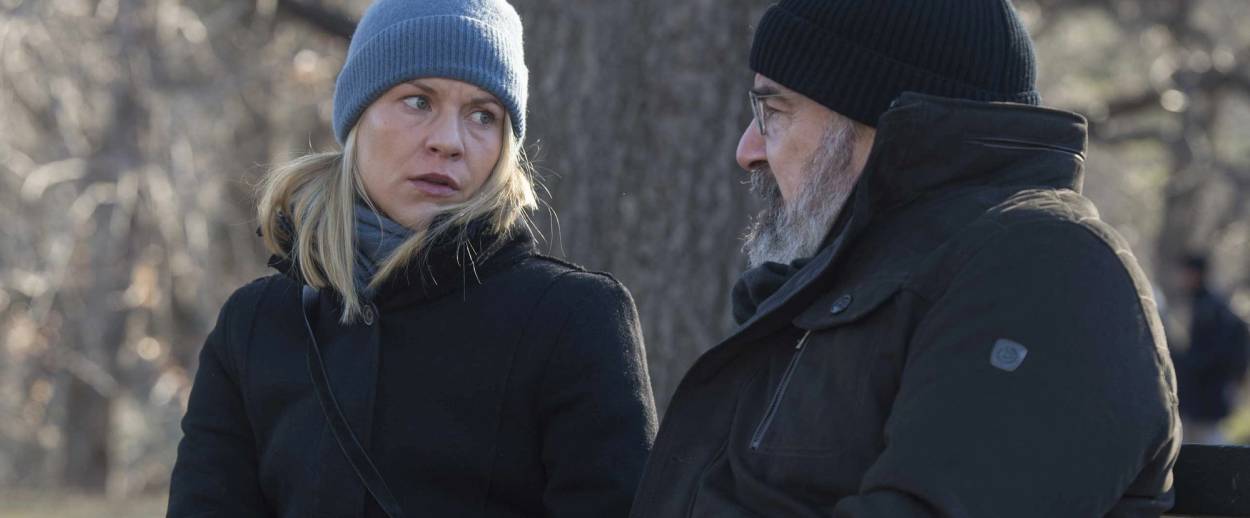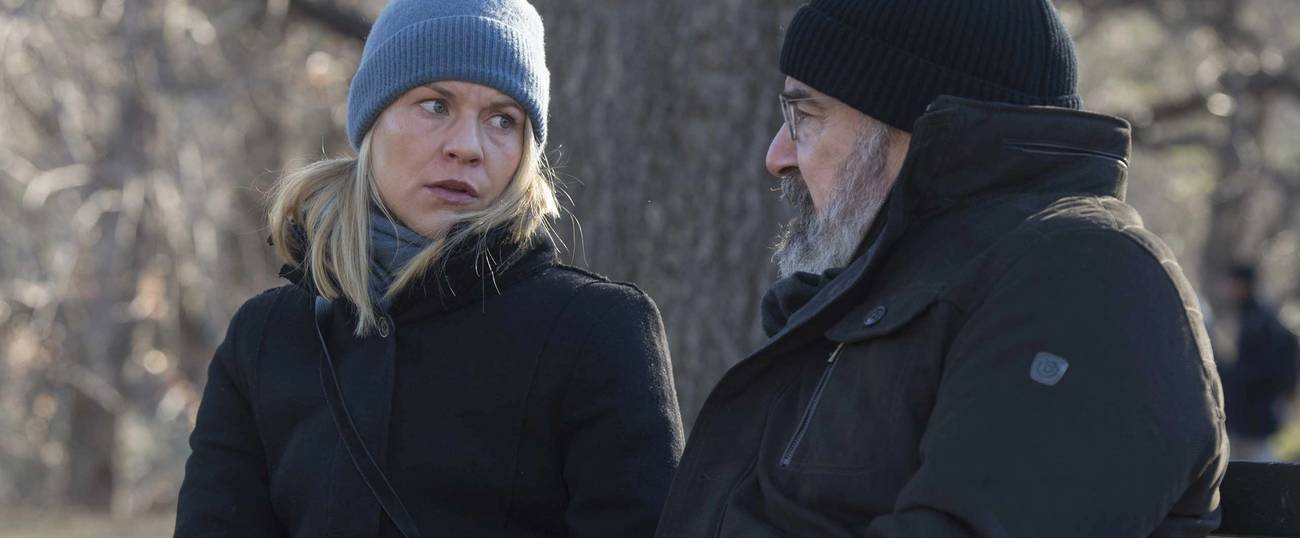In its sixth season, Homeland went rogue. What began six years ago as a gripping, edgy dramatization of the war against Islamic terror waged by well-intentioned, but deeply flawed intelligence officers took a dramatic dive this season into the politically correct. Intelligence officials who risk their lives to prevent another Sept. 11 are anti-Islamic and untrustworthy. Israel is a racist state determined to oppress Palestinians and thwart America’s nuclear deal with Iran. The nation’s first female president—which must have seemed like a sure thing last summer when the show was initially scripted—turns out to be not what she seems. American Muslim communities are demonized victims of an overzealous FBI. While al-Qaida and its even more virulent successor, Islamic State, were the enemy in the first five seasons, the enemy in season six is no longer IS, but us.
Yet partly because of its gifted cast and Lesli Linka Glatter’s superb direction, Homeland remains compelling. Former CIA operative turned civil-rights-defender Carrie Mathison (Claire Danes) is still among the most exasperating, if riveting, characters on TV. Ditto, the CIA’s Saul Berenson (Mandy Patinkin), her CIA mentor and protector, a former director who has fallen or been pushed from grace but remains as determined as ever to soldier on for his country. You never stop rooting for British heartthrob Peter Quinn (Rupert Friend), America’s answer to James Bond, no matter how disabled and seemingly dysfunctional the former special-forces assassin has become after Islamic terrorists nearly kill him with sarin gas in Season 5 in a planned terrorist attack at a Berlin subway station at rush hour. Canny CIA survivor Dar Adal (F. Murray Abraham), Saul Berenson’s false friend and evil dramatic bookend, becomes ever more villainous in the name of pursuing America’s national-security interests as he defines them.
Despite sterling performances—plus the introduction of two superb new characters, alt-right broadcaster Brett O’Keefe (Jake Weber), and President-elect Elizabeth Keane (Elizabeth Marvel), Season 6 was a dramatic, disappointing departure from the tone, themes, and often-discomforting honesty of the show’s earlier years. If frantic rewriting ensued when its creators misjudged the outcome of America’s presidential race, its writers seemed to have panicked in the wake of Donald Trump’s stunning election upset and accusations that their Emmy-winning series was “anti-Muslim,” and hence, feeding candidate Trump’s ugly assault on Muslims, refugees, immigrants, and America’s tradition of openness and tolerance.
Suddenly, as actor Patinkin acknowledged in a recent interview on NPR’s WBUR in Boston, the show’s writers and actors concluded that Homeland’s focus on Islamist terror was “part of the problem of the Islamophobia.” “It became very painful to the writers, and to all of us,” he said. “A tremendous amount of attention has been paid trying to be part of the cure instead of part of the problem.” In Season 6, the writers were “tremendously successful” in having reversed the show’s traditional themes and designations of good and evil. During Season 6, he asserted, viewers came to understand that “the guilty ones are certainly not the Muslim community, certainly not the refugees or the immigrants who have come here, but the white male membership, even of the intelligence community and other parts of our government.”
The charge that the show demonizes Muslims by focusing on radical Islamic terror is as old as Homeland itself. In 2012, a Salon reviewer called Homeland “TV’s most Islamophobic show.” In the Washington Post two seasons later, Laura Durkay, a New York City-based “writer, filmmaker, and activist” for AlterNet, Gay City News, and the Socialist Worker, called it the “most bigoted show on television” and accused it of carelessly trafficking in “absurd and damaging stereotypes.” This was no surprise, Durkay added, since Homeland was not only based on an Israeli show titled Prisoners of War, automatic grounds for suspicion in leftist circles, but was created by Howard Gordon, Alex Gansa, and former Israeli paratrooper Gideon Raff, the team that produced 24 after Sept. 11—a show whose hero, Jack Bauer, an intelligence officer who tortured and took no prisoners, channeled America’s fury and fear in the wake of its deadliest terrorist attack.
Though Homeland’s writers retain their uncanny knack for anticipating real events—in this season’s case, some of the election campaign’s most ominous themes, sock puppets, BOTS, a secret propaganda boiler-room producing “fake news,” and the extent to which fear and such reports influenced elections—they were also clearly unnerved by Trump’s improbable win, and the starkly divided hyperpolitical climate that ensued. As Gansa, the self-described left-leaning showrunner and main writer of Season 6, acknowledged: “To say we took it calmly would be a complete lie,” he told The Hollywood Reporter. “My first reaction was, ‘Oh my God, we are now counterfactual to the point of being irrelevant.’ ” Because eight of the show’s 12 episodes were already written and six of them filmed by the time the election results came in November, Homeland wound up with a female president-elect Keane who seemed to possess, weirdly, both Hillary Clinton’s calm demeanor and experience and Donald Trump’s isolationist instincts.
Perhaps the leading victim of Homeland’s feverish self-revisionism was bi-polar counterterrorism warrior Carrie Mathison, who relinquished her cloak-and-dagger to become daughter Franny’s devoted mom in a Brooklyn brownstone and to provide free legal assistance to American Muslims entrapped in ostensible terror plots by the evil FBI. Instead of killing secret al-Qaida agents and ferreting out sleeper Islamist cells to protect Americans as she did in earlier seasons, she comes to the aid of a teenager falsely accused of having provided material support to ISIS after he posts suicide videos and calls for jihad on Facebook. In earlier seasons, hardcore Carrie would not have hesitated to have droned the smug young punk. But this year, a wiser, enlightened Carrie defends his free-speech right to incite violence and jihad online, telling the FBI that her defendant is just a “confused kid.”
The reinvented Carrie accuses law enforcement and her former colleagues in the CIA of “demonizing an entire community.” “This whole country,” she says, “went stupid crazy after 9/11.”
Israel, too, receives its share of rote bashing. During a rare visit to his estranged sister on a West Bank settlement—a cover for a secret meeting with a senior Iranian official—Saul Berenson lectures her about the hatred such outposts engender. Doesn’t she hear the intermittent gunfire sparked by the settlers’ presence on occupied Palestinian land?
Israel’s Mossad is portrayed as equally devious. Its agents not only kidnap Saul Berenson in an effort to discover with whom he was meeting, they conspire to destroy the Iran nuclear pact with Washington by forging false evidence to show that Iran has been cheating on the deal.
President-elect Keane channels the views of Carrie Mathison, her top Middle East adviser who now asserts that the war on terror that she and the CIA have waged since Sept. 11 was ill-conceived and counterproductive. It is the intelligence community and law enforcement—the “deep state”—that cannot be trusted. Or maybe they’re the only true patriots left? While this seeming dichotomy might be a source of engaging drama, here it seems mostly like the product of a panicked writer’s room.
The twists and turns of the plot move at the pace of current events, without offering much in the way of settled insight: In Season 6, which occurs during the 72 days between the presidential election and the inauguration, arch villain Dar Adar, the rogue CIA official, teams up with a small group of rogue military officers, a rogue senator, and a popular promoter of fake news to spread lies about President-elect Keane to prevent her inauguration. Dar eventually balks after learning that his co-conspirators intend not just to discredit and delegitimize the president-elect but kill her. But his effort to warn Carrie comes too late. Quinn dies protecting the president-elect, whose body Carrie also helps shield. In yet another bizarre twist to the season’s final episode, a newly inaugurated, but now secretive, paranoid President Keane seeks revenge on the intelligence community with which she has clashed. Ordering the arrest of Saul Berenson and the other senior national-security officials who tried to protect her, she ignores an incredulous Carrie’s pleas not to arrest “innocent” people. A full-blown police state in Season 7 and 8 seems likely.
Howard Gordon , who left Homeland full-time after the second season, insists that the show’s characters have simply been “evolving,” or “responding to political developments and circumstances as they occur.” Gansa, too, calls criticism that he is trying to reposition the show to become more politically correct “specious.” Homeland’s new narrative, he told a New York Times reporter, was a response to having learned from intelligence experts that “there are no coordinated ISIS or al-Qaeda cells in the United States like there are in Europe.” “Yes,” Gansa said, “there are lone actors and people who self-radicalize … but no terror cells. … So when we sat down to talk about this season, we didn’t want to dramatize any threat to the United States that doesn’t actually exist.”
Gansa and the creators of Homeland have boasted about their high-level briefings from intelligence officials who assured them there were no ISIS cells in America, and hence, no imminent threat to the homeland. Former Marine Gen. John Kelly, the newly minted director of homeland security, has a different view. In a speech at George Washington University soon after Homeland’s season ended, he insisted that the threat to America and its way of life “has not diminished.” Rather, it has “metastasized and decentralized,” remaining “as threatening today as it was that September morning almost 16 years ago.” Since 2013, he said, there have been 37 ISIS-linked plots “to attack our country.” The FBI has open terrorism investigations in all 50 states. Some 10,000 “citizens of Europe” have joined the caliphate in Syria and Iraq, along with thousands more from Asia, Africa, and the Western Hemisphere. “They have learned how to make IEDs, employ drones to drop ordnance, and acquired experience on the battlefield that by all reports they are bringing back home,” he said. Even more ominous, he added, was the “unprecedented spike in homegrown terrorism” in the past few years. In the past year alone, there were 36 homegrown terrorist cases in 18 states.
Will Homeland devotees stick with a show newly focused on PC themes, whose deep state poses a graver threat than imported or home-grown Islamic terrorism? The ratings, though still strong, are not encouraging. Homeland’s finale drew 1.9 million total viewers, according to Nielsen data, 72 percent larger than the 1.1 million viewers for the disappointing premiere. Although the final episode’s audience was 37 percent larger than that of the penultimate episode, average viewership across multiple platforms for Season 6 was half a million viewers smaller than for Season 5, which averaged 6 million. If this trend continues, the show may be looking for a new slot on MSNBC, perhaps following Rachel Maddow.
Gansa has suggested that in Seasons 7 and 8, Carrie may well go back into to the field for the CIA. If the downward viewing trend persists, her reassignment and the show’s return to its roots may come not a moment too soon.
Like this article? Sign up for our Daily Digest to get Tablet Magazine’s new content in your inbox each morning.

